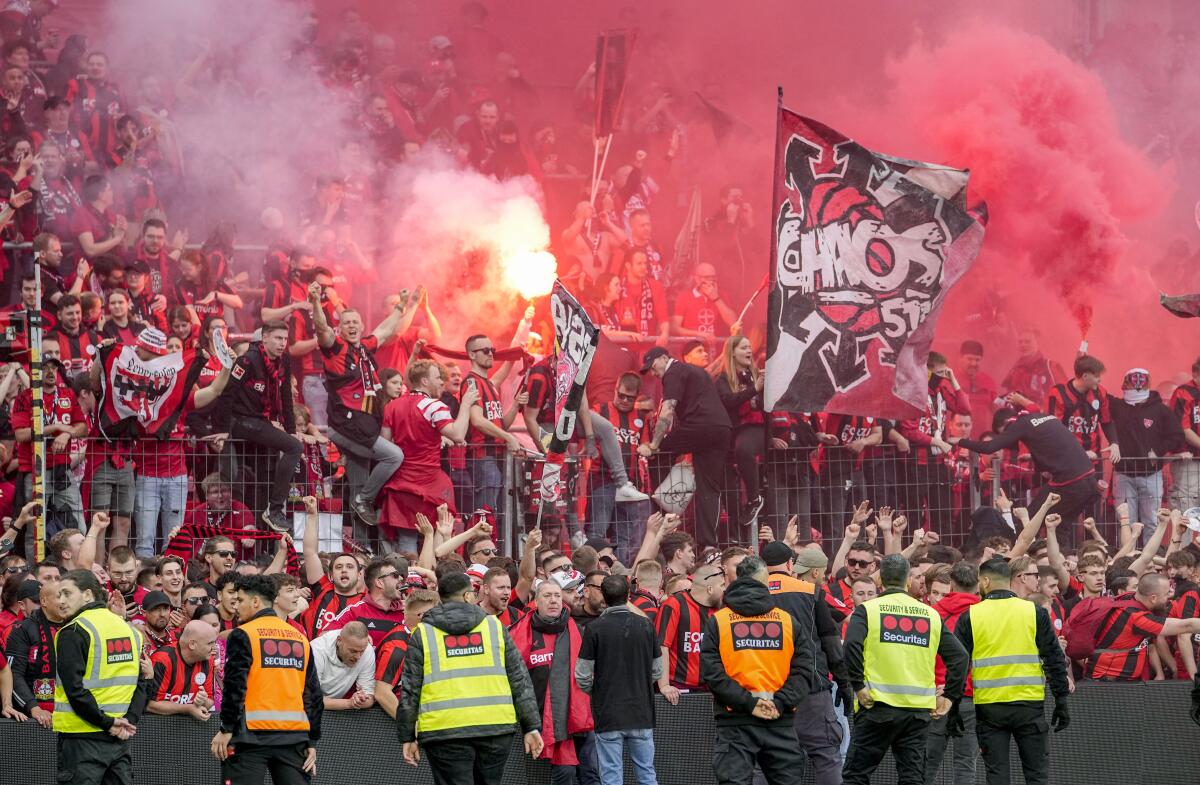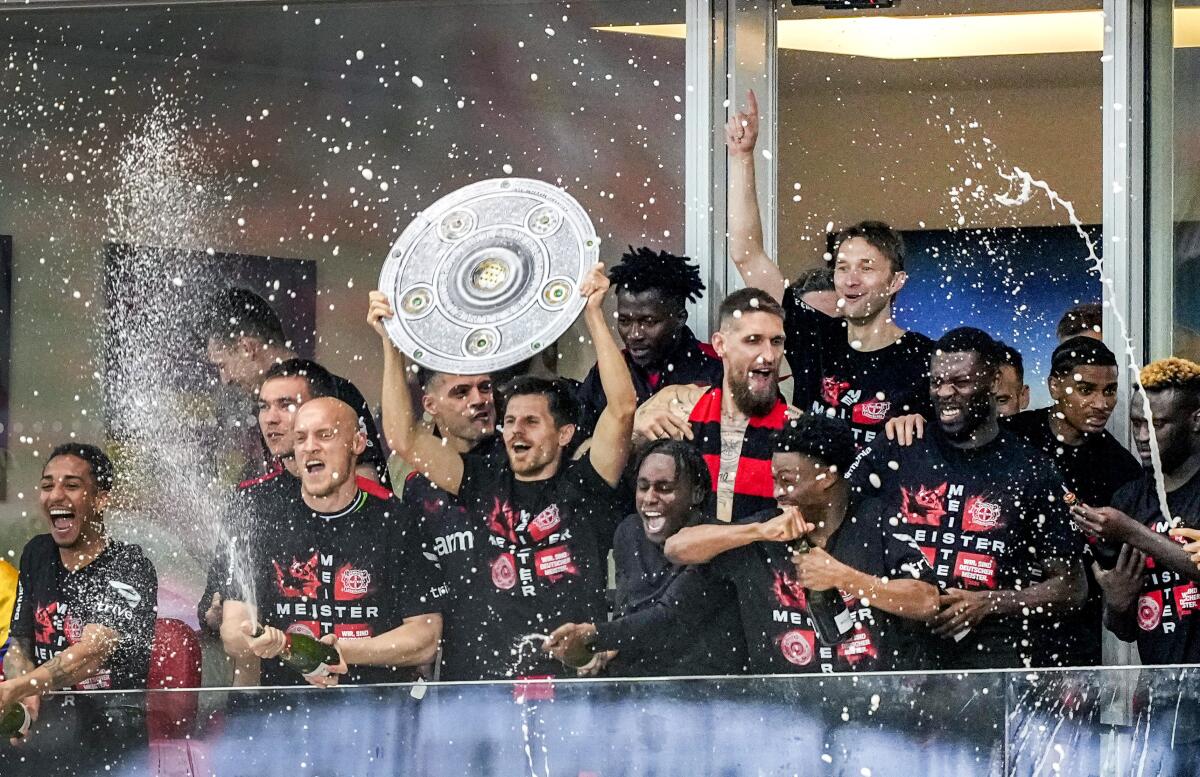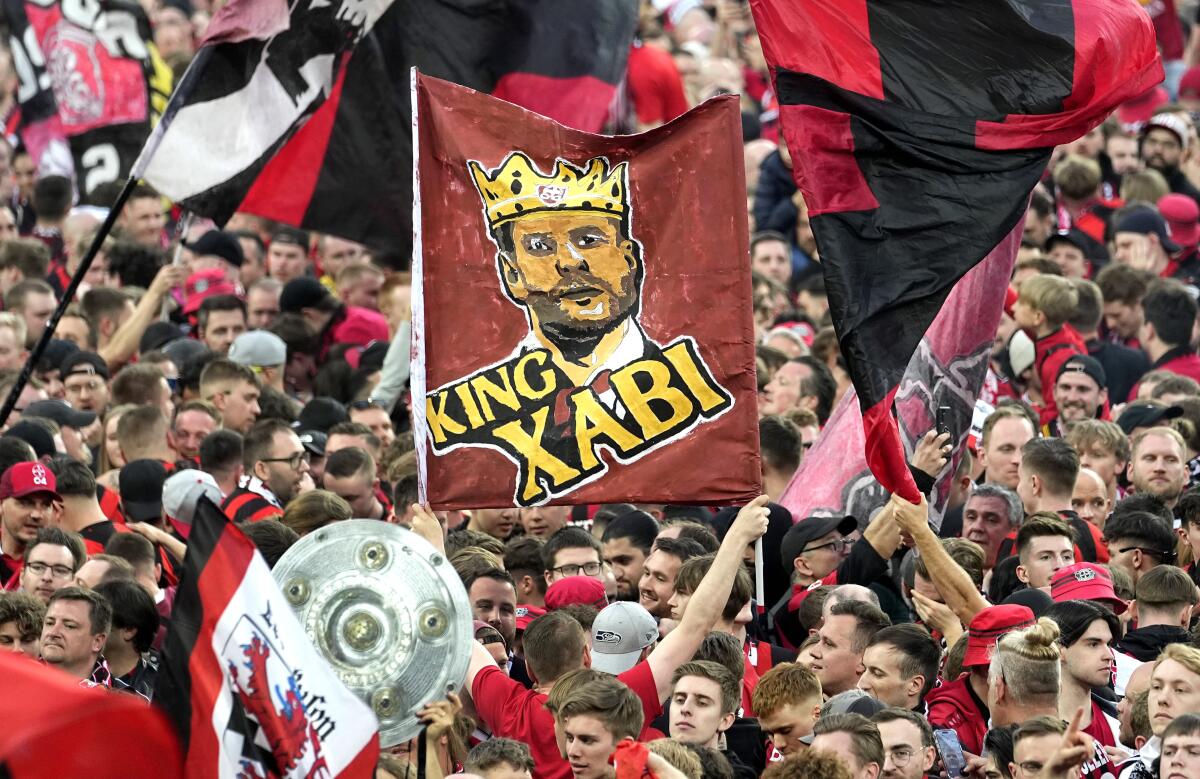[ad_1]
Bayer Leverkusen’s long-suffering fans had waited 120 years for their team to win a league title. On Sunday, with their first Bundesliga crown just seven minutes away, their patience finally ran out.
When Florian Wirtz’s second goal gave Leverkusen a 4-0 lead over Werder Bremen in the 83rd minute of a game it had to win to clinch the championship, supporters began poring out of the stands and onto the pitch. On the bench, players danced and hugged one another.
When Wirtz scored again moments later, the stands again emptied and referee Harm Osmers abandoned the match. What more did anyone need to see?
Not only had Leverkusen at long last shed its Anglicized nickname “Neverkusen,” but it had done so in dramatic fashion, running its German-record unbeaten streak to 43 games in all competition to secure the title with five weeks left in the season.
“Finally, we can say Bayer Leverkusen is German champion,” said coach Xabi Alonso, who took over early last season when the team was facing relegation. “The first title is always special for everyone. So to be part of this history feels incredible.”
With Sunday’s win, Leverkusen ended Bayern Munich’s 11-season reign as Bundesliga champion — a run Alonso helped start by leading Bayern to three straight championships as a player a decade ago. And there may be more history to come since Leverkusen (25-0-4) is bidding to become the first team to finish a Bundesliga season unbeaten.

Bayern Leverkusen fans celebrate after the team defeats Werder Bremen to clinch the German Bundesliga title.
(Martin Meissner / Associated Press)
With 13 points in its final five games, Leverkusen would break Munich’s record of 91 points in a season, set in 2013, and it also has a chance at a treble since it leads West Ham 2-0 after the first leg of the Europa League quarterfinal and will face second-division Kaiserslautern in the German Cup final in Berlin on May 25.
“We are not focusing on record numbers,” said Simon Rolfes, a former Leverkusen player and academy manager who, as managing director of sport, was the architect of the championship roster. “We are focusing on the [two] running competitions. The season is not over. Jobs have to be done still.”
The title didn’t come cheaply, with Rolfes spending more than $96 million on six players in last summer’s transfer window. But he got what he paid for with the newly acquired pair of Victor Boniface and Alex Grimaldo combining for 20 goals and 20 assists while longtime goalkeeper Lukas Hradecky led the league in shutouts (14) and save percentage (78.7%).
Yet Leverkusen’s payroll, estimated at $70 million a year, remains just a quarter of what Bayern Munich is spending. Leverkusen wins because it is more a team than a collection of stars, with four players — led by Boniface and the 20-year-old Wirtz, a product of Leverkusen’s development system — contributing at least eight goals and seven assists each.
“We’re proud of the style of play we’ve shown on the field this year,” Rolfes said in an email interview. “Balance and depth is crucial. When Boniface went down with an injury, others were there to secure our results. There are many players in the team that have strong offensive skills — but they put the group in front, not themselves.”

Bayern Leverkusen players celebrate after winning the Bundesliga title on Sunday.
(Martin Meissner / Associated Press)
Vanquishing Bayern Munich, the richest club in Germany and the sixth-richest in the world, is a major achievement, not just for Leverkusen but for the Bundesliga and all of club soccer.
Europe’s top five leagues have long been dominated by super clubs, meaning most teams — and their supporters — had little reason to aspire to a championship when the season began. That power structure may be crumbling, however. Juventus, which won nine consecutive titles in Italy’s Serie A, will finish short of the summit for a fourth straight season this year. And Spain’s La Liga hasn’t had a repeat winner in five years.
“Perhaps it’s healthy for the Bundesliga, also for German football, for another team to win,” Alonso said.
But doing that takes more than just the team on the field, said Fernando Carro, the team’s Barcelona-born CEO.
“Of course, the squad mainly constructed by Simon Rolfes is excellent. Xabi Alonso’s work as a head coach is outstanding. That is apparent,” said Carro, who joined Leverkusen in 2018. “But the truth is you need many parts of the organization delivering up to 100%; efforts that might be invisible to the outside, but [are] important factors for sustainable growth and success.
“Last you need, very simply, a bit of luck — because sports will never be predictable.”

Bayern Leverkusen fans hold up a banner depicting coach Xabi Alonso during a match against Werder Bremen on Sunday.
(Martin Meissner / Associated Press)
The challenge now is for Rolfes and Carro to take advantage of the opportunities Leverkusen’s historic season present. Even if the team falls short in its two remaining competitions, it is the German champion and the only unbeaten team in a major European league. That will mean millions of dollars in additional sponsorships, money that can be spent to pay the many players who are now likely to listen to the team’s offers.
“Naturally having an attractive squad on the field and historic results benefits the business side of the organization,” Carro said. “We need to take advantage of the momentum.
“Coming from a business background, I found it important from the beginning back in 2018, to look at the organizational and personnel tasks in order to professionalize Bayer. We invested in brand building and digital projects in tailored international content for our core markets. We played two games in the USA and Mexico in 2022 and plan on diverse projects globally for the near future.”
But Carro cautioned against making Leverkusen’s success solely about the bottom line.
“Nobody working in sports should take decisions just because of possible revenues,” he said. “I love my job. I love to help lift an organization and its people to another level.
“Success on the field and rising attention then almost automatically will make it easier to increase your resources.”
Whether that will make Leverkusen perennial contenders or a one-season flash in the pan remains to be seen. After all, the team has won just one title in 120 years. Bayern Munich has won the Bundesliga 17 times this century alone.
“Bayern has resources that other clubs in our league do not have and they can keep their team together while others in the Bundesliga need to transfer their players for revenue generation,” Carro said. “But we’ve always known that we could put a team together to challenge and possibly even overtake them.
“Myself, I always want to win, no matter how good the chances might be. You have to believe that you can do it.”
On Sunday they did.
⚽ You have read the latest installment of On Soccer with Kevin Baxter. The weekly column takes you behind the scenes and shines a spotlight on unique stories. Listen to Baxter on this week’s episode of the Corner of the Galaxy podcast.
[ad_2]
Source link

